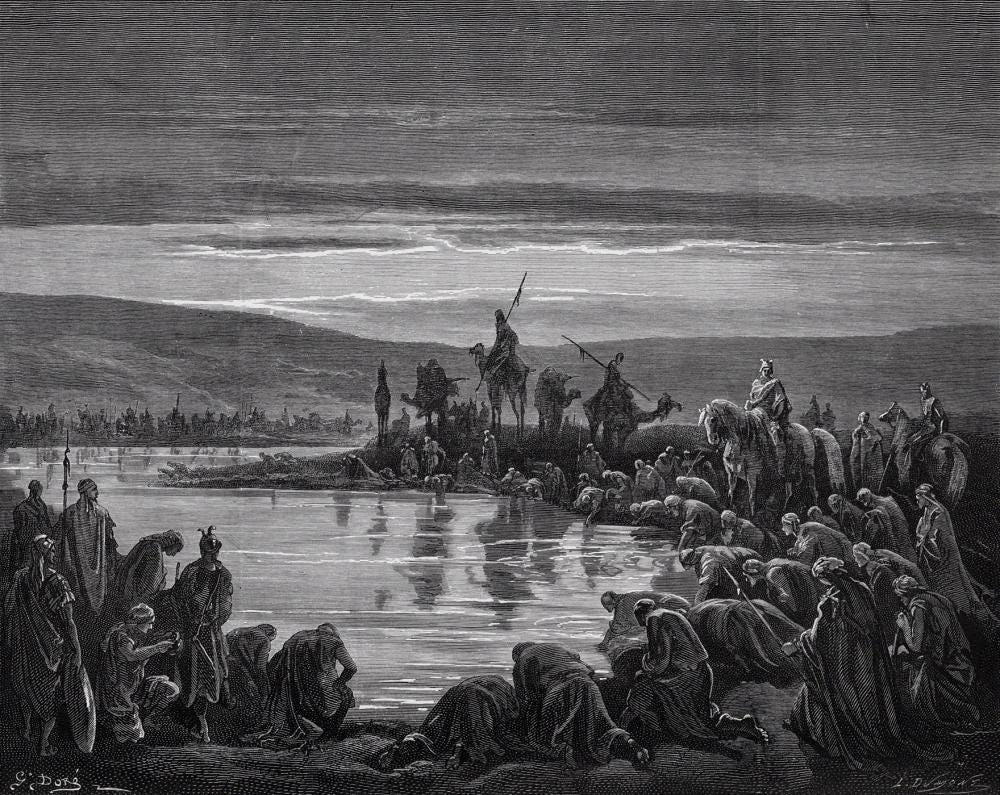The ancient Book of Judges includes a gallery of would-be heroes of nearly mythological proportions: left-handed swashbuckling assassins, superhumanly strong champions, dudes who can fend off hundreds of enemies at once with a glorified bo staff. Blood flies. Viscera galore.
Definitely not your typical light reading or appropriate bedtime story material for kiddos.
Honestly though, most of what goes down in Judges is more… embarrassing than good.1 Taking center stage throughout are the characters’ deep flaws.
Everybody loves Gideon. He’s timid, insecure, has limited manpower; all relatable for most of us in some way. Despite these obstacles, he becomes the hero Israel needs. And don’t get me wrong, he has some top-tier moments for an Old Testament deliverer. Yet often glossed over are his fearful inhibitions in following God’s instructions. Take this example after his first divine encounter:
25 Now on the same night the Lord said to him, “Take your father’s bull and a second bull seven years old, and pull down the altar of Baal which belongs to your father, and cut down the Asherah that is beside it; 26 and build an altar to the Lord your God on the top of this stronghold in an orderly manner, and take a second bull and offer a burnt offering with the wood of the Asherah which you shall cut down.” 27 Then Gideon took ten men of his servants and did as the Lord had spoken to him; and because he was too afraid of his father’s household and the men of the city to do it by day, he did it by night.
28 When the men of the city arose early in the morning, behold, the altar of Baal was torn down, and the Asherah which was beside it was cut down, and the second bull was offered on the altar which had been built.
— Judges 6:25-28
At first glance, it’s all great. Destroying the altar of Baal? Slicin’ up the Asherah? Now we’re talkin’.
But if you’ve got a sharp eye, you might have noticed something: Gideon was so afraid of people, he tore down the Baal and Asherah shrine at night.
Festering at the core of Gideon’s heart was a problem. You see it flare up when he meets the angel of the LORD. It festers with the Baal and Asherah episode. Then it reels and staggers with the test(s) of the woolen fleece. God pokes and prods at it while He wittles away at Gideon’s army until the group is little more than a backwoods guerilla unit. Yahweh clearly called and chose Gideon for an unbelievable underdog story. But what was his hangup?
Sneaking under the surface of Gideon’s soul was a lack of TRUST.
George Macdonald wrote “to be trusted is a greater compliment than to be loved”,2 and I can’t help but think God probably feels the same way towards humanity. Most of Scripture, in one way or another, chronicles the initiatives of a powerful God looking to convince people He can and will do and be what He says. Culminating this is Christ, urging His Church to walk in purity and power by trusting in Him to work through Her in the pages of history. As much as God loves us and desires us to love Him, it is most evident we love Him when we display trust in His words and act on them in our lives.
Gideon isn’t alone in this; a refusal to trust Yahweh actively is the root of every biblical judge’s (and actually all of Israel’s) problems. Let us learn from their tragic mistakes. From this perspective, we look to the Teacher of Proverbs and read:
5 Trust in the Lord with all your heart
And do not lean on your own understanding.
6 In all your ways acknowledge Him,
And He will make your paths straight.— Proverbs 3:5-6
You cannot say you love God if you are not willing to trust God.
Practically, this affects our approach to just about everything: what we do with our money, how we divide and manage our time, when we pray, where we work or play, who we build relationships with, and more. The cornerstone of the Christian life is trusting in God. Without this key building block, disciples of Jesus are left unstable and susceptible to deception, disillusionment and destruction.
And trust is hard. So often, people let us down. They betray us and abandon us and pick us last and ostracize us. Or at the very least, our imperfect minds can be manipulated by the kingdom of darkness into thinking or expecting people to do those things. Trust is always a gamble; Hemingway surmised “The way to learn whether a person is trustworthy is to trust him.”3 You’re putting your safety and certainty on the line with people.
The beautiful news is that placing your trust in God is an eternal investment that never goes sour. Christ’s guarantee is to always lead us forward — not in perfect experiences devoid of struggle or discomfort, but always in triumph.4 For Gideon, it took several lessons for God’s message of trusting in His power and wisdom to hit home. One included eavesdropping on an enemy telling someone about his weird barley-bread nightmare (God uses whatever He wants *shrug*). Finally, it resulted in victory.
When our wonder gazes on God’s power, supernatural trust blossoms. We must believe God’s character is good and that what He says is true. He is worthy of all our trust and confidence. To sum up, if you really want to NOT embarrass yourself before God with your life, try simply trusting Him with what’s going on.
In what way do you need to place your trust in Him now?
I leave you with 3 things to help you meditate and reflect on trust today:
A psalm to pray and meditate on;
A podcast episode on trusting God;
A set of reflection questions, which also work in small group settings.
SCRIPTURE
9 The Lord also will be a stronghold for the oppressed,
A stronghold in times of trouble;
10 And those who know Your name will put their trust in You,
For You, O Lord, have not forsaken those who seek You.— Psalm 9:9-10
PODCAST EPISODE
REFLECTION QUESTIONS
What do I have a hard time entrusting to God?
Am I slow to believe reports of miracles?
How do my finances reflect my reliance on God?
Do I test the Holy Spirit by my lack of obedience?
Is my first reaction to challenges in life a cynical, worst-case-scenario analysis, or an expectation for Jesus to show Himself strong in my situation? Why?
Where do I find myself depending on my own intelligence or savvy the most instead of trusting God?
How can I take the leap of trusting the LORD in one way this week?
[Wednesday Wonderisms is a short devotional reflection I’ll be sharing each midweek morning. Whether it’s sparked by a Scripture, a conversation with a friend, personal musings while raising my three kids or thoughts on the state of the Church, the goal is to encourage you to become an even more ardent worshiper of King Jesus. Hit the link below to share it with a friend.]
The last six chapters of Judges showcase a terrible downward slide as Israel devolves into total idolatry, immorality and anarchy. For a helpful overview of themes and important context, check out the Bible Project’s video on the Book of Judges.
MacDonald, G. (1877). The Marquis of Lossie. B. Tauchnitz. p. 26.
Hotchner, A. E. (1966). Papa Hemingway: a personal memoir. Pt. 2, Ch. 6.
See 2 Corinthians 2:14.











Always appreciate a good George Mac cameo 💯 His theology was very much centered on the fatherhood of God and the sonship of the believer, which absolutely deals with love and trust abiding together, inseparably. Do we trust that our Father’s intentions toward us are good? Can He trust us, as his children, to represent his heart faithfully?
This is good. I wonder if trust and love can be actually separated? Also I wonder if/how God trusts us, as in the reversal of the questions you've posed. Like with a father who allows his son to demand an inheritance and set off for the distant country...curious! Thanks for sharing, Kaleb!